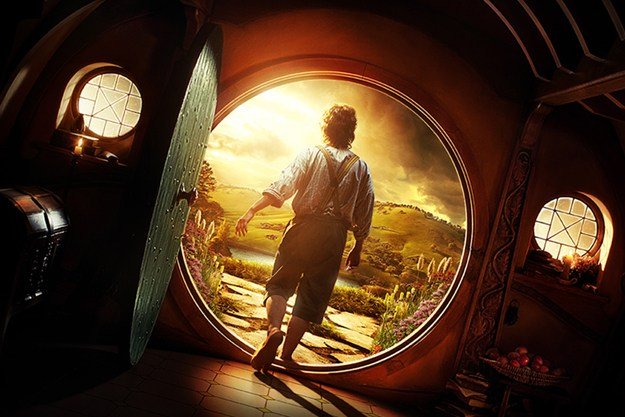Bilbo Baggins, an extraordinary adventurer
"I have no use for adventures. Nasty disturbing uncomfortable things! Make you late for dinner!"

The Hobbit is a tale about the extraordinary adventures of a rather ordinary (or perhaps not so ordinary?) hobbit named Bilbo Baggins. At the start, Bilbo is a reluctant adventurer. Hobbits, as the narrator tells the reader, love comfort, and that means food, a dry home, an arm chair in which to sit down, and pocket handkerchiefs readily on hand (11,45). At first, Bilbo laughs at the idea of going on adventures, which are “[n]asty disturbing uncomfortable things!” (15). However, throughout the book, Bilbo continually surprises the reader, and himself, by going out of his comfort zone and exercising his bravery. This, arguably, turns Mr. Baggins, a rather ordinary little hobbit, into an extraordinary friend and adventurer.
Throughout The Hobbit, Bilbo is continually being thrust into nasty, disturbing, uncomfortable situations yet he perseveres through the discomfort and comes out victorious. This is seen in the first half of the book in Bilbo’s encounters with the Trolls, the Goblins, Gollum, the Wargs, and the spiders in Mirkwood. In the second half of the book, Bilbo completes his transformation into a weathered adventurer after he survives two encounters with the great dragon Smaug. What makes Bilbo such a relatable and appealing protagonist is the fact that he is not an emotionless being; he feels fear but does not let it control him. When he goes inside the Mountain for the first time he trembles with fear “but his face [is] set and grim” (259). Where the old Bilbo would flee from danger, this new Bilbo faces it head on, even though he still is a Baggins and constantly wishes “again and again for his nice bright hobbit-hole” (81). When Bilbo hears the sounds of a giant dragon waiting for him at the bottom of the passage, he still follows through with his role as burglar. The narrator says that “[g]oing on from there was the bravest thing he ever did” (260). From this point onwards, Bilbo is a new hobbit; he has new confidence in himself and goes on to play a major part in the events following his encounter with Smaug.
After his encounter with Smaug, Bilbo takes initiative and leadership among Thorin and Company. The narrator remarks that the Dwarfs “would have all been killed, if it had not been for Bilbo” when he anticipates Smaug’s wrath and tells them all to flee into the tunnel (264). A few pages later, the narrator comments that Bilbo has “become the real leader in their adventure. He [has] begun to have ideas and plans of his own” (268). These ideas and plans are acted upon when Bilbo takes initiative to try to bring peace between Men and Elves and the Dwarfs by bringing the Arkenstone to Bard and the Elvenking, without the Dwarfs’ knowledge. Bilbo’s bold behaviour at the end of the novel completely contrasts with his timid character at the beginning of the story.
What makes Bilbo so extraordinary is that, even though he becomes brave and adventurous, he still retains his fondness of food and hearth and home. He is very happy to return to Bag-End “and the sound of the kettle on his hearth [is] ever after more musical than it had been even in the quiet days before the Unexpected Party” (363). Yet there is undoubtedly a change in Bilbo, for he keeps his sword and coat of mail on display (363). He now composes poetry and loses his respectable reputation among the Hobbits because he is “an elf-friend, and [has] the honour of dwarves, wizards, and all such folk as ever passed that way” (361, 363). Bilbo is a Tookish adventurer but never loses the Mr. Baggins side of him and retains his lovable hobbit-tendencies. However, his adventures give him a new identity that can be summarized in the speech Bilbo gives to Smaug: “I am the clue-finder, the web-cutter, the stinging fly…I am he that buries his friends alive and drowns them and draws them alive again from the water…I am the friend of bears, and the guest of eagles. I am Ring-winner and Luckwearer; and I am Barrel-rider” (270). These many titles prove that while Bilbo may appear to be an ordinary hobbit, he is anything but ordinary.
Works Cited
Tolkien, J.R.R. The Hobbit. Harper Collins, 1998.
Welcome!!! To help you better structure your writing, I would suggest using markdown: https://steemit.com/steemit/@thecryptofiend/markdown-basics-for-beginners
Do you enjoy any other fantasy books or just stick to Tolkien? I'd recommend the Silmarillion but thats a pretty dry read.
Tolkien is one of my favourite authors. I've read The Silmarillion and The Children of Hurin and enjoyed them both quite a bit. I've read all four books in the Inheritance Cycle and read some other fantasy series. I just finished The Queen of Attolia by Megan Whalen Turner.
Congratulations @rennoelle, this post is the forth most rewarded post (based on pending payouts) in the last 12 hours written by a Dust account holder (accounts that hold between 0 and 0.01 Mega Vests). The total number of posts by Dust account holders during this period was 3730 and the total pending payments to posts in this category was $624.26. To see the full list of highest paid posts across all accounts categories, click here.
If you do not wish to receive these messages in future, please reply stop to this comment.
notification!
@steemit-earn has just posted his lesson